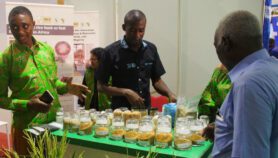By: T.V. Padma
Send to a friend
The details you provide on this page will not be used to send unsolicited email, and will not be sold to a 3rd party. See privacy policy.
Leading geneticist Samir Brahmachari explains why India should kickstart a new ‘open source’ approach to drug discovery for diseases like TB.
Samir Brahmachari is one of India’s leading genetics researchers and the director general of India’s Council of Scientific and Industrial Research (CSIR), a network of 38 government laboratories.
Brahmachari is kick-starting an ‘open source’ approach to drug discovery, focusing first on tuberculosis (TB). He envisages a system where researchers all over the world work on different areas of drug design and deposit their findings into an open database for others to use and comment on — particularly for infectious diseases that affect the world’s poor.
As the world marks ten years since the genome of the TB-causing Mycobacterium tuberculosis was published — and with no new drugs on the immediate horizon — T. V. Padma talks to Brahmachari about the potential, and necessity, of open source drug discovery.
You once described open source drugs as your passion. Why do you feel so strongly about their need in developing countries?
When the human genome was sequenced, scientists promised the world that it would make a difference to healthcare. The Mycobacterium tuberculosis genome was sequencedexactly ten years ago and we have still not solved the problem of TB. So as a genomics scientist it became my obligation — if we have not been able to solve the problem of TB, how can we solve the problems of other human diseases?
Most public-funded institutions do a lot of biomedical research but the last mile of drug discovery is left to the pharmaceutical industry — which is a ‘closed-door’ activity.
My idea is that affordable drugs are a right for all, and all drugs can be made available. When it comes to TB or diseases of the poor — where the market incentive is very small — it is not possible to convince the pharmaceutical companies to work on these drugs. Therefore it is the responsibility of public-funded institutions to participate.
Why should we worry about intellectual property protection for infectious diseases and diseases of the poor? Why can’t we share our ideas and brains to create an open source platform for drugs for these diseases in the same way that the human genome has been sequenced and the Internet developed? These developments have empowered India and other developing countries to contribute data for open source drugs.
Do you advocate open source as an across-the-board strategy for all drugs, or for selected areas only?
Targeted drugs that are market driven — or that rich people can afford — can be made by the [patent-protected] route. But for drugs that are not driven by the market and are needed by the poor, open source is an advantage.
The choice depends on the product. Think of it like building a factory to make an expensive product compared with a paddy field. It might be worth building a wall around a factory and restricting access, but do you build walls around the fields growing rice for the poor? If you do, then the cost of building and maintaining the wall goes into the price of rice, and the poor will no longer be able to buy it. Open source is for the ‘paddy fields‘ that everyone needs, not the luxury goods factory.
An open source approach runs against the current global emphasis on tightening patents and intellectual property rights. Will it survive opposition from powerful pharmaceutical companies inside and outside India?
On the contrary, you will be surprised to learn that, in the case of TB, many pharmaceutical companies have shown interest in this concept and responded to my initiative. They would like to see a drug breakthrough because of the huge number of patients who need it.
Also, today the private sector is increasingly talking about corporate social responsibility. Private companies are becoming conscious of their social responsibility and many would like to join such initiatives. And there are many private non-profit foundations, such as Bill Gates’ Foundation, who support affordable drugs initiatives.
Are you not worried that open source discovery will reduce the incentive for pharmaceutical companies to invest in research, and that public sources will lack the funds to make up the difference?
I am not worried about that. If the private companies do not come forward with research and development in neglected diseases, then it becomes the obligation and responsibility of the public-funded institutes to undertake the research. India is now no longer a poor country and the Indian government can afford to invest money for such research.
India has benefited in the last 50 years from its scientists delivering affordable generic drugs to the market. Take E-Mal [an artemisin-based anti-malarial drug developed by two CSIR laboratories]. We in public-funded institutes developed and made it available to everybody. Today the Indian market is flooded by E-Mal. We don’t get royalties from it. So it can be done by public-funded institutes.
And look at the success of NMITLI [CSIR’s New Millennium Indian Technology Leadership Initiative, launched in 2000 as a public-private partnership to promote technology development]. The partnership has brought down the cost of research and development in TB, psoriasis, diabetes and arthritis. Public and private industries can work together.
What has been the response from top scientific institutes outside the CSIR network in India and from other countries?
Within India it has been overwhelming. I have received so many letters from institutes, universities and pharmaceutical companies expressing interest in taking part in the open source drug discovery programme for TB that it is becoming difficult to accommodate all requests.
Even big pharmaceutical companies, such as AstraZeneca, and leading universities, such as Berkeley, have shown interest in collaboration. Sabeer Bhatia, a founder of Microsoft’s Hotmail, has agreed to support us by developing the software.
An important point — somewhat overlooked — is the participation of brilliant minds in the open source model. Where knowledge is free, brilliance flourishes. I believe that, in principle, technology areas such as energy, water and food can also benefit from the open source model. In the case of energy, we may invite solutions to tap solar energy, wind energy, hydropower and other sectors. Similar methods could be adopted in other areas.
Would you support radical changes in the international rules on access to medical innovations — for example more relaxed patent regimes that place greater emphasis on the needs of developing countries?
On the international platform India will always support providing affordable healthcare for all. So for infectious diseases and diseases of the poor, intellectual property protection should not be the prime consideration.
I see this as a war — a war for the right for health and affordable medicines for all. Affordable healthcare is a global problem, as big as the problem of terrorism.
What is the single most important change in patents rule at the international level that you would like India to help secure?
When it comes to infectious diseases, compulsory licensing [where pharmaceutical companies must allow their product to be produced cheaply by a country in a medical emergency] should be used on all drug patents so that we can make the drug at low cost and make it affordable for poor people.
Do you see a role for India in promoting such changes internationally?
India should take the lead role and responsibility for making healthcare affordable to all. Together with the poor people in Asia and Africa, some three billion people would benefit from affordable drugs. Therefore, India should undertake this initiative, given its own track record in making cheap generics available to many countries.













